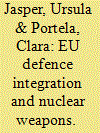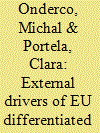|
|
|
Sort Order |
|
|
|
Items / Page
|
|
|
|
|
|
|
| Srl | Item |
| 1 |
ID:
151311


|
|
|
|
|
| Summary/Abstract |
The emergence of targeted sanctions in the mid-1990s was due to the humanitarian impact of embargoes, which were deemed unacceptable and compelled senders to shift to measures designed to affect only wrongdoers. Twenty years on, the present paper considers the extent to which autonomous sanctions are designed to affect those individuals and elites responsible for the behaviour the EU aims to condemn. How faithful has the EU remained to this concept in its sanctions policy? The enquiry scrutinizes diverse practices in three established sanctions strands of the EU, development aid suspensions, Common Foreign and Security Policy (CFSP) sanctions and Generalised Scheme of Preferences (GSP) withdrawals. It shows that it has been more faithfully implemented in some strands of EU sanctions than in others. Specifically in the flagship CFSP sanctions practice, the due process motivated court challenges of its blacklists have led the EU to modify selection criteria in a way that renders them potentially less targeted.
|
|
|
|
|
|
|
|
|
|
|
|
|
|
|
|
| 2 |
ID:
096037


|
|
|
| 3 |
ID:
102304


|
|
|
|
|
| Publication |
London, Routledge, 2010.
|
| Description |
xvi,206p.
|
| Standard Number |
9780415552165, hbk
|
|
|
|
|
|
|
|
|
|
|
|
Copies: C:1/I:0,R:0,Q:0
Circulation
| Accession# | Call# | Current Location | Status | Policy | Location |
| 055739 | 341.242/POR 055739 | Main | On Shelf | General | |
|
|
|
|
| 4 |
ID:
190069


|
|
|
|
|
| Summary/Abstract |
Since its establishment, the Common Foreign and Security Policy (CFSP) has strived to increase convergence among EU member states. Yet, convergence remains elusive and scholars have started to explain the emergence of differentiated cooperation resulting from multiple internal EU crises. We posit that the convergence in the EU member states with respect to nuclear weapons has been fundamentally altered by the humanitarian turn to nuclear disarmament. This has led to a crystallization of differentiated subgroups among the member states, whose membership coincides with that of informal groupings active in the broader nuclear nonproliferation regime. Combining quantitative data on resolution sponsorship at the Non-Proliferation Treaty review process and voting at the UN General Assembly, we show that significant change in the international nuclear nonproliferation regime led to differentiated cooperation within the CFSP, resulting in two cohesive subgroups of member states.
|
|
|
|
|
|
|
|
|
|
|
|
|
|
|
|
| 5 |
ID:
142432


|
|
|
| 6 |
ID:
097086


|
|
|
| 7 |
ID:
099334


|
|
|
|
|
| Publication |
2010.
|
| Summary/Abstract |
The article examines the external image of the EU among elites in five selected Southeast Asian countries: Malaysia, Thailand, Vietnam, Singapore and the Philippines. Southeast Asia offers an interesting area for examining perceptions. Firstly, this region is linked to Europe by a long-standing and prosperous trade relationship. Secondly, the Association of South East Asian Nations has embarked on a process of deepening integration, adopting certain elements of the EU in its design. How desirable is the EU experience as an example of how to deepen integration? And how are EU external policies such as trade, human rights and environment perceived by stakeholders in the region? The article analyses perceptions on the themes of integration and external polices, contrasting them with the scholarly understa
|
|
|
|
|
|
|
|
|
|
|
|
|
|
|
|
| 8 |
ID:
127845


|
|
|
|
|
| Publication |
2014.
|
| Summary/Abstract |
The present article looks at the evolution of Spanish views on deterrence and non-proliferation. Like every member state of the North Atlantic Treaty Organisation (NATO), Spain is covered by the US nuclear umbrella and has accepted the logic of deterrence, while at the same time maintaining a denuclearised status and committing to the goal of disarmament enshrined in the non-proliferation treaty. This article explores the background of Spain's apparently contradictory situation as a denuclearised member of NATO and how it positions itself in regard to the nuclear question in the current security context. It concludes that while Spanish nuclear 'exceptionalism' originally rested on the reluctance of the political elites to alter the precarious compromise that once allowed for Spain's accession to NATO as a denuclearised member, it gradually withered away to give way to a close alignment with Alliance policies driven by a desire to preserve strong security links with its partners.
|
|
|
|
|
|
|
|
|
|
|
|
|
|
|
|
| 9 |
ID:
050356


|
|
|
|
|
| Publication |
Frankfurt, Peace Research Instutue Frankfurt, 2003.
|
| Description |
iii, 39p.
|
| Series |
PRIF report; no. 65
|
| Standard Number |
3933293839
|
|
|
|
|
|
|
|
|
|
|
|
Copies: C:1/I:0,R:0,Q:0
Circulation
| Accession# | Call# | Current Location | Status | Policy | Location |
| 047524 | 327.1747/POR 047524 | Main | On Shelf | General | |
|
|
|
|
| 10 |
ID:
185682


|
|
|
|
|
| Summary/Abstract |
The UN frequently employs sanctions on the same conflicts where it attempts mediation. While both efforts carry a UN stamp, they follow different political logics that are not always coherent with each other: sanctions are enacted by the UN Security Council, while mediation is led by a special representative/envoy of the UN Secretary-General, often on the basis of a Security Council mandate. This article explores two UN interventions in Libya that combined mediation with mandatory sanctions: the conflict leading to the overthrow of the Muammar Qaddafi regime (2011) and the civil war that ensued when the country was split between the first elected parliament and its successor (2014–2015). The Libyan case illustrates that the coherence of mediation and sanctions ultimately depends on the UN Security Council unity of purpose.
|
|
|
|
|
|
|
|
|
|
|
|
|
|
|
|
| 11 |
ID:
142435


|
|
|
|
|
| Summary/Abstract |
Sanctions are frequently applied by the UN Security Council (UNSC) as well as regional organizations. While the objectives sought often vary, a frequent commonality is that they target African states. Indeed, Africa is the most frequently targeted continent by the UNSC and regional organisations including the African Union, Economic Community of West African States and the European Union. However, little attention has been paid to the confluence of this sanctions activity by these different organizations. This article seeks to address this gap in the research. While the UNSC continues to focus on sanctioning to end hostilities, the regional organizations have assigned themselves unconstitutional changes to government as the principal reason to sanction African states. Drawing on data from the Targeted Sanctions Consortium (TSC), this article suggests that: 1) regional organisations are leading UNSC activity more often than is appreciated in the literature; 2) the UNSC has of late been expanding its sanctioning activity to consider issues of democracy and good governance; 3) the UNSC uses sanctions to endorse the activity of African regional organizations to deal with crises on the continent; and 4) UNSC and regional sanctions are intimately tied to crisis management in Africa.
|
|
|
|
|
|
|
|
|
|
|
|
|
|
|
|
|
|
|
|
|